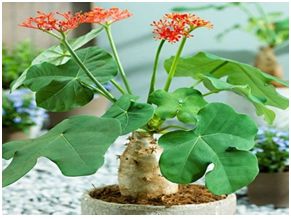
Botanical Name – Jatropha podagrica Hook.
Common Name - Buddha Belly
Classification:-
Kingdom - Plantae
Division - Tracheophyta
Class - Magmoliopsida
Order - Malpighiales
Family - Euphorbiaceae
Genus - Jatropha
Species - podagrica
Characteristics Of Euphorbiaceae Family-
The Euphorbiaceae are distinctive in having unisexual flowers with a superior, usually 3-carpellate ovary with 1 ovule per carpel, apical-axile in placentation, many taxa with red, yellow, or usually white (“milky”) latex, the Euphorbioideae alone with reduced staminal flowers, some with a characteristic cyathium inflorescence.
Habitat:- forested areas , forest edges.
Distribution:- India: Assam; Guatemala
Status:- Threats
Plant description:-
J. podagrica is a caudiciform perennial herb growing up to 1 metre (3 feet) tall. The grey-green, knobby, swollen caudex has a bottle-like appearance, giving rise to some of the common names.
Leaves are held on long fleshy yet stout petioles which emerge from the tip of the stem and radiate in all directions. Leaves are peltate and 3 or 5 lobed. Dense clusters of small, orange-red, flowers are held above the leaves on long slim peduncles.
Fruit are green capsules at first, becoming blackish-brown at maturity, when they explode and scatter their seeds up to 4 metres (13 feet) away.
USES-
There are many uses of J. podagrica in folk medicine.
These are including as an analgesic, tonic, aphrodisiac, purgative, laxative, and to treat infections, intestinal worms, snakebite, gout, and more.
Other uses include tanning, dye making, soap making, biofuel, fish poison, lamp lighting, and fertiliser.